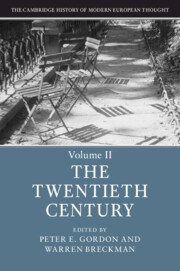Book contents
- The Cambridge History of Modern European Thought
- The Cambridge History of Modern European Thought
- The Cambridge History of Modern European Thought
- Copyright page
- Contents
- Contributors
- Preface
- Introduction
- 1 Sociology and the Heroism of Modern Life
- 2 Psychoanalysis: Freud and Beyond
- 3 Modern Physics: From Crisis to Crisis
- 4 Varieties of Phenomenology
- 5 Existentialism and the Meanings of Transcendence
- 6 Philosophies of Life
- 7 The Many Faces of Analytic Philosophy
- 8 American Ideas in the European Imagination
- 9 Revolution from the Right: Against Equality
- 10 Western Marxism: Revolutions in Theory
- 11 Anti-imperialism and Interregnum
- 12 Late Modern Feminist Subversions: Sex, Subjectivity, and Embodiment
- 13 Modernist Theologies: The Many Paths between God and World
- 14 Modern Economic Thought and the “Good Society”
- 15 Conservatism and Its Discontents
- 16 Modernity and the Specter of Totalitarianism
- 17 Decolonization Terminable and Interminable
- 18 Structuralism and the Return of the Symbolic
- 19 Post-structuralism: From Deconstruction to the Genealogy of Power
- 20 Contesting the Public Sphere: Within and against Critical Theory
- 21 Restructuring Democracy and the Idea of Europe
- Index
16 - Modernity and the Specter of Totalitarianism
Published online by Cambridge University Press: 19 August 2019
- The Cambridge History of Modern European Thought
- The Cambridge History of Modern European Thought
- The Cambridge History of Modern European Thought
- Copyright page
- Contents
- Contributors
- Preface
- Introduction
- 1 Sociology and the Heroism of Modern Life
- 2 Psychoanalysis: Freud and Beyond
- 3 Modern Physics: From Crisis to Crisis
- 4 Varieties of Phenomenology
- 5 Existentialism and the Meanings of Transcendence
- 6 Philosophies of Life
- 7 The Many Faces of Analytic Philosophy
- 8 American Ideas in the European Imagination
- 9 Revolution from the Right: Against Equality
- 10 Western Marxism: Revolutions in Theory
- 11 Anti-imperialism and Interregnum
- 12 Late Modern Feminist Subversions: Sex, Subjectivity, and Embodiment
- 13 Modernist Theologies: The Many Paths between God and World
- 14 Modern Economic Thought and the “Good Society”
- 15 Conservatism and Its Discontents
- 16 Modernity and the Specter of Totalitarianism
- 17 Decolonization Terminable and Interminable
- 18 Structuralism and the Return of the Symbolic
- 19 Post-structuralism: From Deconstruction to the Genealogy of Power
- 20 Contesting the Public Sphere: Within and against Critical Theory
- 21 Restructuring Democracy and the Idea of Europe
- Index
Summary
It often happens in the history of thought that philosophers come belatedly to a popular theme and attempt to make it serve new purposes. They volunteer to articulate intuitive sentiment and to make implicit dilemmas explicit. And they take what emerged as partisan slogans and determine whether to raise them to the level of philosophical claim. Just as regularly, however, the discourse that stimulated the thinkers proves stronger than their innovations. It is not, after all, as if the public noise around concepts, especially new ones, is stilled when the philosophers turn to canonize them. Hannah Arendt and Claude Lefort, the most serious theoreticians of what appeared to so many as a novel and unprecedented phenomenon of “totalitarianism” in the last century, attempted to make an extant discourse rigorous. They developed proprietary approaches that reshaped a popular intellectual discourse. To an impressive extent, however, their interventions did more to amplify the impact and to extend the longevity of the popular theories of “totalitarianism” they dearly hoped to reorient.
- Type
- Chapter
- Information
- The Cambridge History of Modern European Thought , pp. 417 - 437Publisher: Cambridge University PressPrint publication year: 2019



